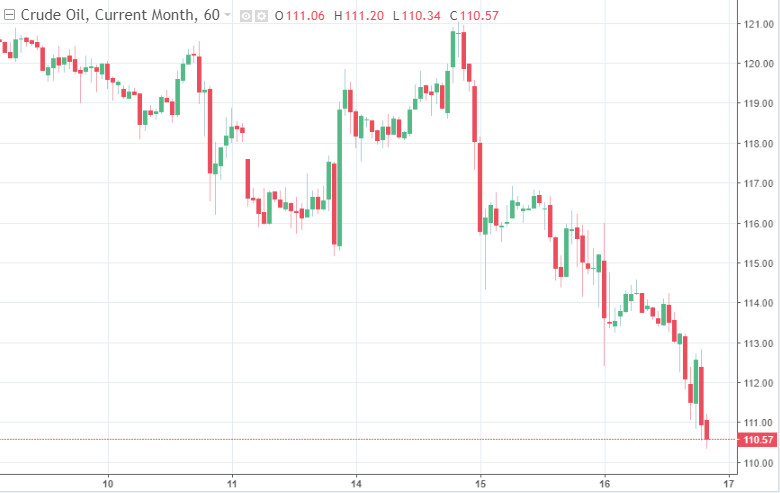At the auction on Thursday, world prices for oil are losing about 2%. The participants in the commodity market are focused on the prospects for economic recovery amid permanently growing inflation and decisive steps taken by the world's key central banks in the fight against it.

So, at the time of writing, the cost of August futures for Brent crude fell by 1.82% to $116.35 per barrel, and July futures for WTI oil by 1.79% to $113.25 per barrel.
On Thursday, investors are behaving extremely cautiously, worried about the prospects for disruptions in the supply of oil and ever-increasing global inflation. In addition, traders reacted negatively to yesterday's news about the increase in the key interest rate by the US Federal Reserve, because a tangible tightening of monetary policy could trigger a drop in oil demand.
Recently, the world's central banks have been actively fighting the increase in inflation and sharply tightening their monetary policy. So, on Wednesday evening, following a two-day meeting, the Fed increased its key rate by 75 basis points at once - up to 1.50-1.75%. Such a spectacular increase in the indicator by the central bank has not been seen since 1994.
As part of a press conference following the US central bank meeting, Fed Chairman Jerome Powell said that next month the level of the base rate could be increased by another 50-75 basis points.
In addition, on Thursday the media reported on the increase in key interest rates by the central banks of Switzerland and Great Britain. Thus, the Bank of England raised the rate by 25 basis points - up to 1.25% per annum for the fifth consecutive month. The Swiss National Bank also raised its rate by 25 basis points to -0.25% per annum for the first time in 15 years.
Against this background, the US dollar rose against the euro by 0.4%, and against the pound by 0.2%. Traditionally, a more expensive dollar makes oil less accessible to holders of alternative currencies.
At the same time, the main factors supporting the oil market are still concerns about supplies under the sanctions against the energy sector of the Russian Federation, as well as expectations on demand from China, one of the key consumers and importers of oil. Based on these strong incentives for the growth of the commodity market in the short term, analysts confidently argue that the current fall in world oil prices is likely to be short-term and imperceptible.
By the way, even at the beginning of the session on Thursday, oil showed a moderate rise after a loud fall the day before.
The cost of August contracts for Brent oil increased by 0.3%, to $118.87 per barrel, and July futures for WTI oil, by 0.45%, to $115.83 dollars. As a result of the trading session the day before, the price of Brent oil lost 2.2%, and WTI - 3% while statistics from the United States were published.

According to the latest data from the US Department of Energy, over the past week, commercial stocks of raw materials in the country unexpectedly increased by 2 million barrels. At the same time, market analysts predicted an increase in the indicator by only 1.1 million barrels. Distillate reserves also increased more than expected, while gasoline reserves unexpectedly sank. At the same time, the level of oil production in the United States over the past seven days increased by 100,000 barrels per day - up to 12 million barrels per day.
 English
English 
 Русский
Русский Bahasa Indonesia
Bahasa Indonesia Bahasa Malay
Bahasa Malay ไทย
ไทย Español
Español Deutsch
Deutsch Български
Български Français
Français Tiếng Việt
Tiếng Việt 中文
中文 বাংলা
বাংলা हिन्दी
हिन्दी Čeština
Čeština Українська
Українська Română
Română

